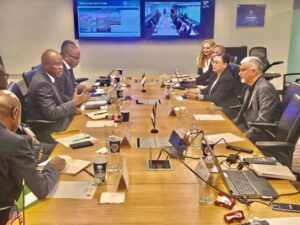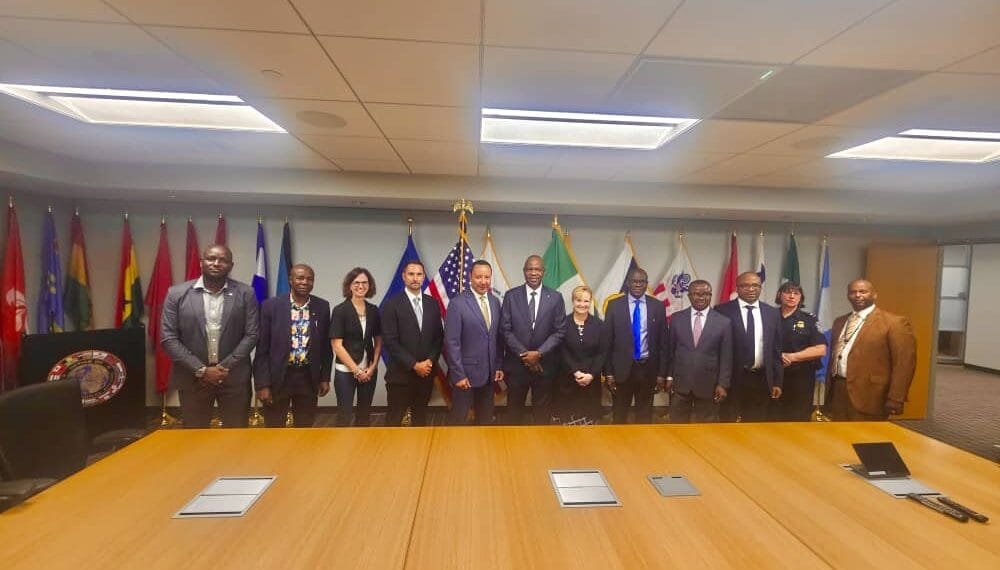In a bid to further strengthen service delivery and improve performance of the Nigeria Customs Service (NCS), Comptroller-General of Customs (CGC), Bashir Adewale Adeniyi, took a significant step in enhancing global partnerships by participating in a bilateral meeting with the United States (U.S.) Customs and Border Protection (CBP) in Washington D.C.
The meeting, which was held at the weekend, focused on reviving the over-decade-old Customs Mutual Assistance Agreement (CMAA) to enhance service delivery through global collaborations and data-driven decision-making to improve national security and effectively combat cross-border crimes.
National Public Relations Officer (NPRO of the NCS, Abdullahi Maiwada, in a statement made available to journalists, quoted Adeniyi as saying that Customs officials have been actively addressing the challenges of cross-border crimes, including drug trafficking, arms smuggling and money laundering while ensuring national security.
He highlighted the successful interception of illegal items, such as drugs and weapons, at major ports and airports in Nigeria, adding: “Reviving the CMAA will bolster the Nigeria Customs Service’s capacity to protect the nation’s borders and enhance service delivery, paving the way for a more secure and prosperous future for all Nigerians.”
The Nigeria Customs helmsman also stressed the need for increased capacity building to tackle Intellectual Property Rights (IPR) enforcement and opiate issues, saying: “Our efforts at the ports and airports have yielded significant results, but there is still much to be done in capacity building and enforcement.”
 Adeniyi further underscored the importance of a Centre for Advanced Cargo and Passenger Data Analysis to mitigate risks pointing out the success of prosecuting wildlife criminals and discussed the need for such a centre to enhance cargo and passenger security.
Adeniyi further underscored the importance of a Centre for Advanced Cargo and Passenger Data Analysis to mitigate risks pointing out the success of prosecuting wildlife criminals and discussed the need for such a centre to enhance cargo and passenger security.
Read also: Military moves to end Crude Oil theft in Niger Delta
He also canvassed an advanced command and control centre to address security concerns, adding: “A dedicated targeting data fusion centre will significantly improve our ability to manage risks and enhance security measures.”
The meeting also covered the challenges of commercial air cargo security and potential partnerships with U.S. government agencies. Adeniyi highlighted the importance of future operations, including CBP’s global targeting advisory directors and their capabilities in information sharing on cargo and passenger sides.
“By customizing our approaches and collaborating globally, we can address the complexities of air cargo security more effectively,” he said.
Speaking, Assistant Commissioner, Office of International Affairs at U.S. Customs and Border Protection, James Collins, noted that data integration, partnerships and targeted efforts to address transnational criminal groups exploiting seams and boundaries, stressing: “Integration of data and international cooperation is crucial in countering transnational threats.”
Collins, who highlighted the importance of collaboration and information sharing in border security and intelligence gathering, also insisted that investing in capacity building, train-the-trainer programmes, and targeted training would help to address gaps in border security.
He stressed the need for secure channels for sharing intelligence and building partnerships with international organisations to sustain efforts in combating illicit trade and traffic. “Continuous training and secure intelligence sharing are vital to our success in maintaining border security,” Collins noted.
Key action items identified include establishing specific channels for continued intelligence sharing between the Nigeria Customs and CBP, exploring operational partnerships between Nigeria Customs units and networks like CBP to coordinate cross-border responses, as well as leveraging INTERPOL programmes and collaborating with other West and Central African countries in tackling transnational crimes.
A highpoint of the meeting was the presentation on Artificial Intelligence by Sunil Madhugri from the Office of Information and Technology, U.S. Customs and Border Protection, during which the future of technology in enhancing customs operations and security with Madhugri saying: “Artificial intelligence will play a pivotal role in our strategy to modernize and secure our borders.”
Adeniyi also visited the Nigerian Embassy in the USA, where he was received by the Charge d’Affaires, Rabiu Lawal and his team, even as he (Adeniyi) commended them for their warm reception and their tireless efforts for all the Nigerians in the Diaspora.






